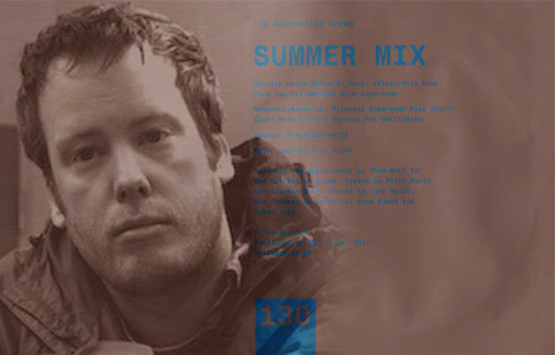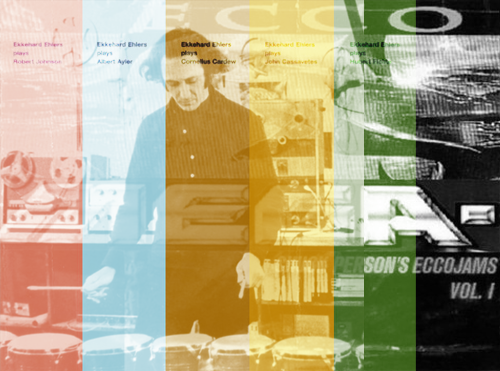In a way, i think "Plays John Cassavetes 2" by Ekkehard Ehlers needs no introduction, but just in case the track is a bit sheltered by its simplicity and abstraction, here it goes: It's just a loop of the first couple seconds of "Goodnight", by The Beatles. Not much more than a loop, layered atop a couple of very simple, barely-there distorted version of the same loop that, while they do lend a nice textural difference and a small variation to the piece, aren't any sort of technical wonder. I think a similar sounding effect can be achieved in Audacity by using a couple of phasers and some softening around the edges. But the important thing, and the reason why i decided to write this, is that this is a track people keep coming back to for how emotionally charged it is. If the track was more popular, i assure you people would be writting comments on how much they miss their exes and how poorly they were treated in high school on the YouTube comments section of its upload, akin to what you can currently see in Rhubarb by Aphex Twin, or any other of his ambient pieces.
.png)
Simplicity is the name of the game. This track really is not much more than a loop and yet it's a song that i avoid playing or else i'll get too emotional, whatever this vague descriptor may mean, to get anything done. And the same can be said about other songs that are just as simple, and, some may even say, lazy.
Okay, Ekkehard Ehlers may have needed a small introduction, however i think that is not the case for Steve Reich and his loop works, like Piano Phase or perhaps more relevant to this conversation, Come Out. A piece of haunting political relevance back then and currently as well. And similarly to Ehlers' track, this is only a loop, accompanied by the same loop slightly phased out with some minimal effects applied. While the first example evoked positive feelings, this does the absolute opposite.
.png)
I think most people can get behind the idea of a minimalist or simplistic approach to music composing but, the amount of times i've heard people call this piece lazy and unoriginal is astonishing. Is it really that hard to see behind the loop and understand the true depth of what it's being said? I think people may get turned off by how simple this piece is but that is where i, along with many other people, find the beauty on it. Or, rather than beauty, the meaning. Repetitiveness can be used as a weapon or as a linguistic choice.
Now bringing this back to a more contemporary approach, we have to talk vaporwave. The genre as a whole has been called lazy, uncreative, unoriginal, downright stealing, and while some of these definitely do apply to some of vaporwave's worst, the concept and practice behind vaporwave remains one that i find reminiscent of these works by Reich and Ehlers. Simple loops, minimal effects if any, and definitely the most important aspect: recontextualization. Through recontextualization we can take the most mundane sounds and transform them into pieces that will inspire generations to come. We can see this being applied on mediums other than sound, i don't think i need to draw yet another comparison between vaporwave and the pop art movement, that point has been made so many times before.
The works of Vektroid and, more revelant to a conversation about minimalism, Chuck Person's Eccojams are prime examples of how relevant these loops can be. I think of the eccojams as the single most influential album of contemporary online music, if not just music in general, at least in the past 30 years, and i know a lot of people do as well, and yet again we find ourselves talking about music that consists of nothing but a couple of seconds worth of audio, played over and over, slowed down, chopped up, with some amount of reverb on top.
.png)
I am one hundred percent here to defend what most skeptics would categorize as lazy. Complexity doesn't equal genius, complexity doesn't equal emotion. If i wanted to get poetic with it, i'd draw similarities between the simplicity of happiness and love and equate it to how most music that evokes these feelings tends to be as simple as these feelings. Some of the most beautiful songs i've ever listened to are things i could replicate in Ableton or Audacity in an afternoon or even just a couple of minutes and, i don't wanna say i have but, i kind of am saying it, i've done just that, and most of my friends who are in the music business have done it as well. In a way we strive for the simplicity that made us fall in love with how we feel when we listen to certain tracks.
Hell, music can be quite simply generated as well, with little to no human intervention, by machines and software. My mind goes to The Automatics Group, a Theo Burt project and its album Summer Mix. They took simple DJ sets, applied their mathematical knowledge on them and through software, they generated abstracted dance tunes that completely recontextualize their original sound, while keeping a gentle lowercase beat that makes us reminisce of the original pieces, while taking them in as a fully new experience: Pop ambient bliss.

And keeping it on-theme with the use of publicly accepted dance mixes and pop music, one might compare this minimal looping structure to pop, i am however sadly not as well versed on this genre to make more than a simple "hey it kinda is similar" remark, so there it is. It is kinda similar and in my opinion, it is for a reason. We relate to this simplicity, we relate to a slower, easier on the ear approach. And there's nothing wrong with that, not on the consumers nor on the artists.
But the artists definitely take a bigger hit with this, when they're labeled as lazy people with a minimal knowledge on how to copy and paste on any audio editing software, but i'd like to take this a step further and ask, if you, the reader, are a musician, or if you're not, put yourself in this situation: How did you get into music making? did you start right off the bat playing complex compositions in whatever instrument you were given? did you create complex layered tracks on Ableton as soon as you installed it legally? chances are, no, you didn't. Everything comes back to simplicity, a return to the innocence and the childlike wondering of "just messing around during an afternoon with Virtual DJ open in your brother's PC". And in a world of complexity, the mind and the ear find a resting spot on simplicity. And if that simplicity takes the form of a middle aged man messing with their reel-to-reel, or a guy opening Audacity and playing Toto slightly slowed down, so be it. It's beautiful and it's not going anywhere. It hasn't gone anywhere. And as long as there's complexity, there will be loops. I'd like to be in a musical scene (or hell, in an overall world) where this isn't seen as a cop out, because we all benefit from this simplicity. Who knows how many amazing pieces hide behind the "slow by 50%" button, or the copy selection and paste tools found in most audio interfaces? The only way to find out is to try it out, and i at least won't shame you for it.
